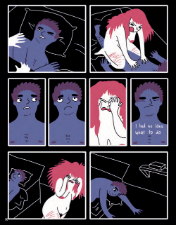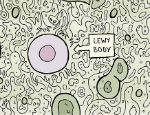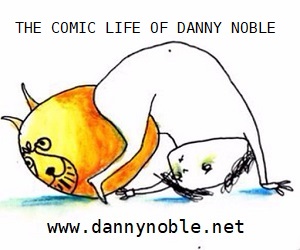 Take It as a Compliment is not simply an effective sequential art record of individual experiences. It’s a proclamation that abuse and harassment can happen to anyone, an exercise in reaching out to those needing support, and a reminder that victims are not alone.
Take It as a Compliment is not simply an effective sequential art record of individual experiences. It’s a proclamation that abuse and harassment can happen to anyone, an exercise in reaching out to those needing support, and a reminder that victims are not alone.
 It becomes impossible when one has been writing about comics for so many years not to fall into familiar patterns of critical analysis in making similar points about different projects. The repetition of such sentiments, however, does not necessarily detract from their pertinence or relevance. Sometimes it is entirely appropriate – and indeed vitally important – to reiterate once again the undeniable strengths of the medium in vividly communicating personal experience with such a unique potency. Take It as a Compliment is one such embodiment of those properties; a compilation of short accounts of sexual abuse, violence and harassment that brings the reader into the lives of their subjects with a raw and disconcerting immediacy.
It becomes impossible when one has been writing about comics for so many years not to fall into familiar patterns of critical analysis in making similar points about different projects. The repetition of such sentiments, however, does not necessarily detract from their pertinence or relevance. Sometimes it is entirely appropriate – and indeed vitally important – to reiterate once again the undeniable strengths of the medium in vividly communicating personal experience with such a unique potency. Take It as a Compliment is one such embodiment of those properties; a compilation of short accounts of sexual abuse, violence and harassment that brings the reader into the lives of their subjects with a raw and disconcerting immediacy.
Take It as a Compliment comprises twenty entries, all illustrated by artist Maria Stoian. Each one is gathered together from largely anonymous sources but linked by the fact that they recount real events. The anthology is an eloquent reminder that abuse can occur across gender and age ranges, in private or in public, at the whims of strangers or loved ones. It’s a sobering and deeply affecting read that is given an added layer of empathetic impact by the artist’s carefully chosen, and often remarkably diverse, narrative and stylistic approaches to the stories herein. Each account is listed in the contents not so much by a title as by a quote from within its pages. This fosters, through a pronounced sense of intimacy, an instant connection with the reader. These lines of dialogue are often direct in emphasis but can also vary from the tangential-sounding to the harrowing in implication. They’re how each account will be referred to throughout the rest of this review.
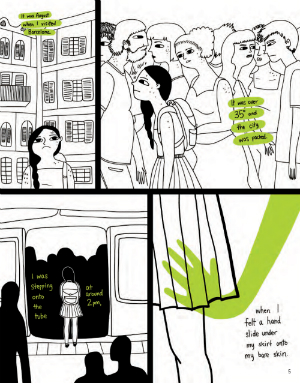 The first 5-pager is called simply “I was 15” (left) and tells of an unnoticed assault on a packed train. Stoian’s technique and clever use of the form is outstanding from the beginning here with her use of colour for the unseen assailants on a black and white backdrop accentuating both the menace of the attackers and the passivity of the crowd around the young victim. It evokes feelings of helplessness and claustrophobia, pulling the audience into the experience and almost drowning them in a sense of powerlessness.
The first 5-pager is called simply “I was 15” (left) and tells of an unnoticed assault on a packed train. Stoian’s technique and clever use of the form is outstanding from the beginning here with her use of colour for the unseen assailants on a black and white backdrop accentuating both the menace of the attackers and the passivity of the crowd around the young victim. It evokes feelings of helplessness and claustrophobia, pulling the audience into the experience and almost drowning them in a sense of powerlessness.
While Stoian’s artistic style retains a recognisable, accessible, and uncomplicated clarity throughout, her structural approach to each individual story varies dramatically. It’s this careful consideration of how best to exploit the strengths of the medium to impart the emotional impact of the events depicted that ensures that Take It as a Compliment is not just an unforgettable piece of social commentary but also a stunning piece of comics craft.
The third story “The feelings of betrayal, guilt and self-hate cannot be described in existing words”, for example, frames events in a series of panels that resemble cameo portraits. Here we are witness to a double betrayal of trust; isolated moments in time drawn together to culminate in gut-wrenching, despair-soaked visual metaphor. Whereas its succeeding tale “I still wonder how I got there from cream soda and pizza pops” (below) is illustrated with a melting, hazy imprecision that reflects the sense of uncertainty and lost time at its core.
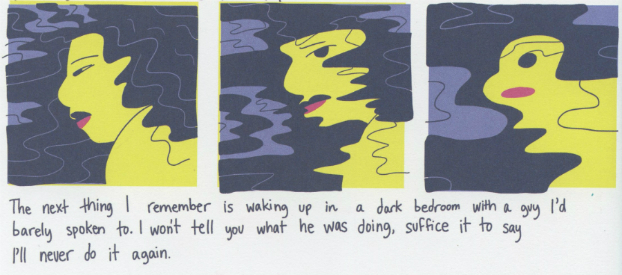 Stoian knows when to expand the accounts she has been given with pure visuals and when to let her subjects’ words take priority with complementary non-sequential imagery. “I have no idea what could have happened if any of those things hadn’t been in my favour that night” (below centre) uses almost stiflingly tight panels to generate tension in an entirely silent and carefully paced retelling of a woman being followed home after a bus ride. The use of colour here is a vital narrative component – as it is throughout the book – in contrasting a sense of safer space with one of encroaching menace.
Stoian knows when to expand the accounts she has been given with pure visuals and when to let her subjects’ words take priority with complementary non-sequential imagery. “I have no idea what could have happened if any of those things hadn’t been in my favour that night” (below centre) uses almost stiflingly tight panels to generate tension in an entirely silent and carefully paced retelling of a woman being followed home after a bus ride. The use of colour here is a vital narrative component – as it is throughout the book – in contrasting a sense of safer space with one of encroaching menace.
“Something like this you don’t forget. It lingers and kills you slowly, until you learn to move on” takes a polarised approach as Stoian allows this most compelling of personal testimonies on an abusive relationship to retain its prose origin with accompanying illustration. Again, it’s indicative of her careful storytelling choices and understanding of when it is appropriate to cast the reader in the role of observer of longer-term developments and when to make them feel instantaneously swept up in what is playing out on the page.
Take It as a Compliment is not simply an effective sequential art record of individual experiences. It’s a proclamation that abuse and harassment can happen to anyone, an exercise in reaching out to those needing support, and a reminder that victims are not alone. Stoian has an extraordinary gift for conveying the complex, self-doubting, and sometimes contradictory emotional responses of the people whose stories she communicates in these shorts. The result is one of the most important, compelling and vital uses of graphic memoir you’ll read this year, and a formidable advocate for the maturity and sophistication of the language of comics.
Maria Stoian (W/A) • Singing Dragon, £14.99 November 2015







